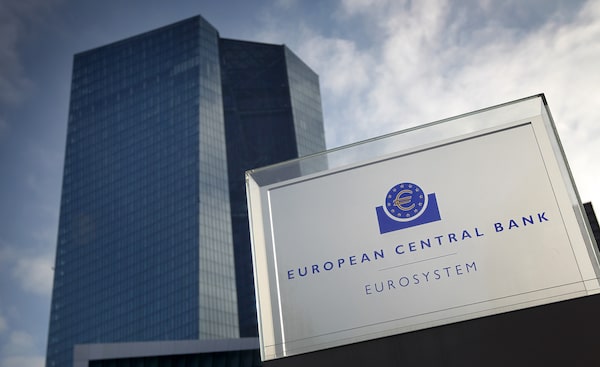
The headquarters of the European Central Bank is pictured in Frankfurt, Germany, on Jan. 23, 2020.DANIEL ROLAND/AFP/Getty Images
The European Central Bank launched a broad review of its policy on Thursday that is likely to see new President Christine Lagarde redefine the ECB’s main goal and how to achieve it.
The euro zone’s central bank has fallen short of its inflation target of just under 2 per cent for years, even after launching increasingly aggressive stimulus measures under Ms. Lagarde’s predecessor, Mario Draghi.
Ms. Lagarde said that aim will now be reviewed, along with the ECB’s tool kit, how it measures price growth and how it communicates with the public.
“We will not leave any stone unturned and how we measure inflation is clearly something we need to look at,” Ms. Lagarde told her second news conference as ECB president.
How the ECB changes its formulation of price stability – currently defined as an annual inflation rate below, but close to, 2 per cent over the medium term – will be crucial to anticipate future policy moves.
The ECB could signal its commitment to boosting inflation by raising the goal to 2 per cent and spelling out that it will take any undershooting just as seriously as an overshoot.
But hawks on the policy-making Governing Council, who have long called for the ECB’s money taps to be shut off, will not go down without a fight.
Some of them favour creating a tolerance band around 2 per cent, which would reduce pressure on the ECB to act, while others would leave the target unchanged or even cut it.
Ms. Lagarde refrained from revealing her favoured option pending the end of the review, expected in November or December.
An analysis on how to better incorporate housing costs, which have been rising fast in Germany and other euro zone countries, is likely to take even longer, Ms. Lagarde added.
CLIMATE CHANGE
The ECB will also look closely at how it can incorporate the economic impact of climate change into its policy.
This is a thorny issue that some of Ms. Lagarde’s colleagues do not believe belongs in a central bank’s mandate at all.
Objections include that a climate change objective might interfere with the ECB’s goal of maintaining price stability or ease pressure on governments to do their part.
“I’m aware of all that but I’m also aware of the danger of doing nothing and I think that, you know, failing to try is already failing,” Ms. Lagarde said.
She added the ECB could look at whether the issuers of the bonds that it buys or accepts as collateral comply with environmental, social and corporate governance criteria.
POLICY ON HOLD?
ECB rate-setters did not make any policy change on Thursday, simply standing by their pledge to keep buying bonds and, if needed, cut interest rates until price growth in the euro zone heads back to their goal.
They did, however, discuss the recent improvement in the economic outlook, which has seen data stabilize and the United States and China reach a trade deal.
Ms. Lagarde acknowledged that views differed on the Governing Council and welcomed the discussion, emphasizing the diplomatic skills that her predecessor was often accused of lacking.
“I’m not a despotic president of the Governing Council,” Ms. Lagarde said. “All governors have their space and time in order to share their perspective and submit their views, but at the end of the day and at the end of the process, we still have to complete the introductory statement and release a monetary policy decision.”
The ECB is widely expected to leave its monetary policy on hold until the review is completed.
That would leave it adding €20-billion ($29-billion) worth of bonds to its €2.6-trillion portfolio every month and charging banks 0.5 per cent on their idle cash for most of the year.
But Ms. Lagarde said the ECB would adhere to its current strategy until a new one is adopted, meaning policy changes could still take place in the meantime.
“We think the ECB will cut interest rates at the end of the year when the review concludes, in order to underline its commitment to meeting the inflation target,” said Paul Diggle, an economist at Aberdeen Standard Investments.
The euro fell against the U.S. dollar after Ms. Lagarde’s news conference and was last down 0.4 per cent at US$1.1046.